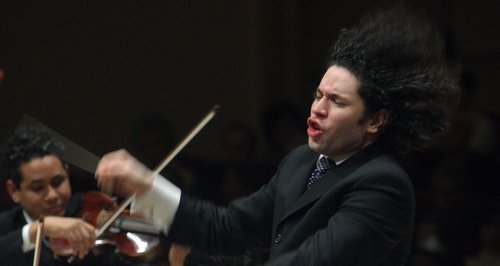By Classic FM London

Simply the most triumphant and winning pieces of music you're likely to hear this awards season.
With The Global Awards done and dusted, we've got winners on the brain. So with belVita, we made this literally unbeatable list of WINNING pieces of classical music. Second place is not an option.
J.S. Bach - St Matthew Passion
Why is it such a winner?
If you thought that Baroque music mostly dealt with plinky-plinky harpsichords paid for by wealthy and obscure members of Royal family, the St Matthew Passion will obliterate your puny mind. There are biblical proclamations of impending apocalypse littered throughout, and for each of them, Bach wangles in some sort of crushing atonality or strange chord, as if he’s wincing with pain each time it happens. This is such a human experience, composed at a time when human experiences weren’t chief among the aims of most Baroque composer composers.
Why is it such a winner?
If you thought that Baroque music mostly dealt with plinky-plinky harpsichords paid for by wealthy and obscure members of Royal family, the St Matthew Passion will obliterate your puny mind. There are biblical proclamations of impending apocalypse littered throughout, and for each of them, Bach wangles in some sort of crushing atonality or strange chord, as if he’s wincing with pain each time it happens. This is such a human experience, composed at a time when human experiences weren’t chief among the aims of most Baroque composer composers.
Tchaikovsky - Symphony No. 6
Why is it such a winner?
Tchaikovsky was surely one of the most personally troubled of the great composers - and this symphony was essentially the outpouring of many of his issues, in a way. Many initially thought it was a lengthy suicide note, others pointed to the hugely controversial homosexual leanings Tchaikovsky was known to have, while some thought it was just a tragic, sad, glorious and indulgent artistic expression. But the reason it’ll stay with you forever is that all of these contexts work in their own way, but it never detracts from how magisterial the music itself is. It’s a lesson in the very best ways of expressing emotions through music.
Why is it such a winner?
Tchaikovsky was surely one of the most personally troubled of the great composers - and this symphony was essentially the outpouring of many of his issues, in a way. Many initially thought it was a lengthy suicide note, others pointed to the hugely controversial homosexual leanings Tchaikovsky was known to have, while some thought it was just a tragic, sad, glorious and indulgent artistic expression. But the reason it’ll stay with you forever is that all of these contexts work in their own way, but it never detracts from how magisterial the music itself is. It’s a lesson in the very best ways of expressing emotions through music.
Mahler - Symphony No. 2
Why is it such a winner?
If you think any bit of music over 3 minutes long is a bit indulgent and full of itself, this single piece will convince you that sometimes it’s completely worth spending an hour and a half on one musical concept (even if it is a huge concept). No other composer could’ve made it more entertaining (listen out for death shrieks!), or more rewarding. The epic final few minutes are a stupidly generous reward on their own, but getting there is half the fun.
Why is it such a winner?
If you think any bit of music over 3 minutes long is a bit indulgent and full of itself, this single piece will convince you that sometimes it’s completely worth spending an hour and a half on one musical concept (even if it is a huge concept). No other composer could’ve made it more entertaining (listen out for death shrieks!), or more rewarding. The epic final few minutes are a stupidly generous reward on their own, but getting there is half the fun.
Beethoven - Grosse Fuge
Why is it such a winner?
It’s proof that not only can critics and audiences get it really, really wrong, but also that it’s all about interpretation. You can actually hear the struggle and the effort it must’ve taken to compose, which means it’s not always a relaxing listen, but few pieces in history have so nakedly shown how a composer can throw absolutely everything into a single work. And, in the end, it was hugely influential to serialist composers of the 20th century with none other than Igor Stravinsky proclaiming it a miracle of music. How about that for delayed gratification?
Why is it such a winner?
It’s proof that not only can critics and audiences get it really, really wrong, but also that it’s all about interpretation. You can actually hear the struggle and the effort it must’ve taken to compose, which means it’s not always a relaxing listen, but few pieces in history have so nakedly shown how a composer can throw absolutely everything into a single work. And, in the end, it was hugely influential to serialist composers of the 20th century with none other than Igor Stravinsky proclaiming it a miracle of music. How about that for delayed gratification?
Mozart - Requiem
Why is it such a winner?
From the opening Introitus, the mournful tone is set. It might just be us, but doesn’t it actually sound like Mozart is scared of death here? Aside from being spooky as anything, the Requiem is a haunting patchwork of things - completed by one of Mozart’s pupils, Franz Süssmayr, it’s become a legendary mystery and the perfect way to end the story of one of history’s most celebrated geniuses - i.e. not end it all. What an enigma.
Why is it such a winner?
From the opening Introitus, the mournful tone is set. It might just be us, but doesn’t it actually sound like Mozart is scared of death here? Aside from being spooky as anything, the Requiem is a haunting patchwork of things - completed by one of Mozart’s pupils, Franz Süssmayr, it’s become a legendary mystery and the perfect way to end the story of one of history’s most celebrated geniuses - i.e. not end it all. What an enigma.
Monteverdi - Vespers
Why is it such a winner?
It makes you realise that just because something’s really old, it doesn’t mean it’s automatically boring, or simply lauded because it was ‘groundbreaking’. Make no mistake about it - Monteverdi’s Vespers are hugely entertaining on their own terms. For starters, it’s simply enormous in scale. If you want to be crude about it (and we do) then you could describe it as Monteverdi taking church music to the opera, with all the drama that implies. Trumpets, drums, massive choruses, florid vocal lines… this really is the greatest hits of the early Baroque.
Why is it such a winner?
It makes you realise that just because something’s really old, it doesn’t mean it’s automatically boring, or simply lauded because it was ‘groundbreaking’. Make no mistake about it - Monteverdi’s Vespers are hugely entertaining on their own terms. For starters, it’s simply enormous in scale. If you want to be crude about it (and we do) then you could describe it as Monteverdi taking church music to the opera, with all the drama that implies. Trumpets, drums, massive choruses, florid vocal lines… this really is the greatest hits of the early Baroque.
Elgar - Cello Concerto
Why is it such a winner?
It’s proof that intense emotion can come from the most unlikely of people. We don’t want to get all mushy on you, but there’s something spectacularly English about how the ultimate stiff-upper-lipped curmudgeon, Edward Elgar, was able to convey his emotions in music rather than in words or actions. His private life was surprisingly tumultuous (that’s another story), and in pieces like the Cello Concerto it’s as if the gasket has blown and Elgar is finally able to let out all the pent-up emotion in a focused blast.
Why is it such a winner?
It’s proof that intense emotion can come from the most unlikely of people. We don’t want to get all mushy on you, but there’s something spectacularly English about how the ultimate stiff-upper-lipped curmudgeon, Edward Elgar, was able to convey his emotions in music rather than in words or actions. His private life was surprisingly tumultuous (that’s another story), and in pieces like the Cello Concerto it’s as if the gasket has blown and Elgar is finally able to let out all the pent-up emotion in a focused blast.
Wagner - The Ring Cycle
Why is it such a winner?
Realising for the first time that the world of opera could actually be this immersive is a very, very special feeling - if you don’t feel bereft at the end of the whole four-opera cycle, we fear for your ability to function in the real world. It’s got a terrible reputation among non-aficionados as ‘that really long opera that no-one likes’, and in a way it represents all the most exclusive, cerebral and faux-worthy stereotypes of the opera world. But we tell you: that perception is WRONG and the Ring Cycle is a fundamentally unhinged work of staggering genius. Ignore at your peril.
Why is it such a winner?
Realising for the first time that the world of opera could actually be this immersive is a very, very special feeling - if you don’t feel bereft at the end of the whole four-opera cycle, we fear for your ability to function in the real world. It’s got a terrible reputation among non-aficionados as ‘that really long opera that no-one likes’, and in a way it represents all the most exclusive, cerebral and faux-worthy stereotypes of the opera world. But we tell you: that perception is WRONG and the Ring Cycle is a fundamentally unhinged work of staggering genius. Ignore at your peril.




No comments:
Post a Comment